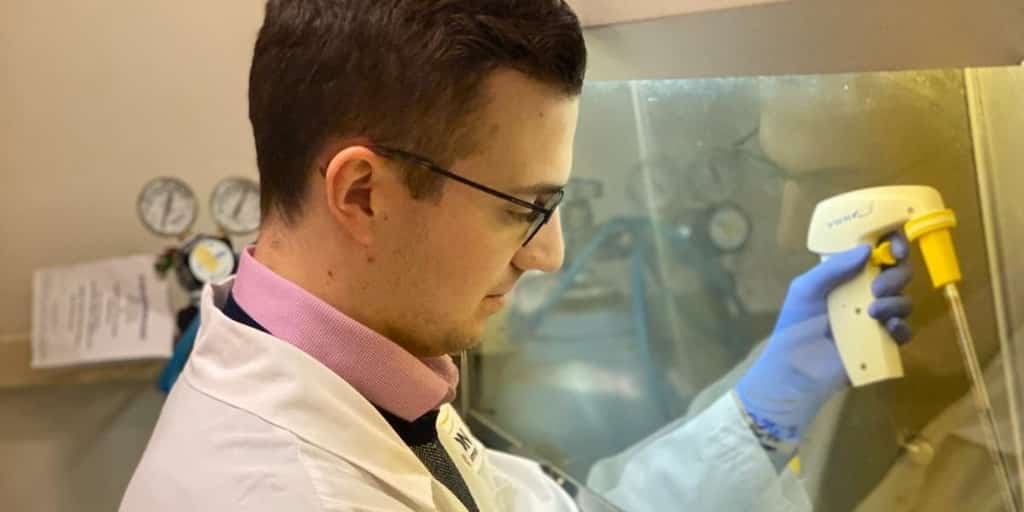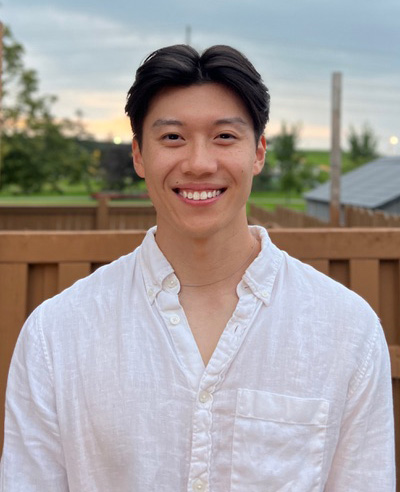1. Welcome back to the TBCRU. Can you remind our readers who you are and share something about yourself?
My name is Braeden Medeiros, and I am a third-year Ph.D. student in the Department of Anatomy & Cell Biology at Western University. I am working in the lab of Dr. Alison Allan at London Regional Cancer Program (LRCP). Before pursuing my graduate work, I completed a Bachelor of Science at Western with an honours specialization in Genetics. Outside the lab, I am currently a reservist with the Canadian Armed Forces, working as a Medical Intelligence Analyst.
2. As a senior researcher, why is the TBCRU Studentship Award important to you? How does it allow you to advance your research?
Receiving the award is a privilege that has helped fund the resources I need to advance my research. This opportunity allows me to share my research with my peers and the public, potentially leading to collaborative projects and further advancements in breast cancer research.
3. In a few lines, can you remind us what you are doing and what problems you hope to solve with your research?
Despite advances in diagnosis and treatment, breast cancer remains a clinical challenge. This is due to a poor understanding of the spread of cancer (metastasis), a process that causes the majority of breast cancer-related deaths. The lung is one of the deadliest sites of breast cancer metastasis, especially for patients with an aggressive subtype of breast cancer – triple-negative (TN) disease.
We have previously observed that TN breast cancer tends to migrate towards and grow in the lung. My project investigates how TN breast cancer signals to or “cooperates” with the lung tissue to support breast cancer metastasis to the lung. My research aims to identify when, why and how lung metastasis develops and how that varies in different subtypes of breast cancer. Our study’s outcomes could lead to earlier detection, improved treatment, and prevention of lung metastasis in the future.
4. Since we last spoke, have there been any changes to or any advancements in your research?
Yes, we have made significant progress in understanding the reason behind the spread of breast cancer cells to the lungs. This work has been published in the journal of Cancers (available here). We demonstrated that TN breast cancer cells make changes in the lungs that enable them to spread. This means that before breast cancer spreads to the lung, cancer cells release various factors that enable the lung to promote tumour spread and growth. Interestingly, this process is unique to TN breast cancers. These findings are very significant and provide insight into earlier detection and prevention of lung metastasis.
5. Have you had an opportunity to present your research to your peer researchers? Was it at a national or international meeting or in some other way?
I had the opportunity to present my research at the first joint meeting with the International Society of Extracellular Vesicles (ISEV) and the Metastasis Research Society (MRS) in Nashville, Tennessee. I am delighted to say this work was well received by the scientific community.
6. Did that presentation setting help you share your breast cancer research with the broader scientific community?
Attending the joint ISEV-MRS conference allowed me to share my research with colleagues and leaders in the field of metastasis research. Given that the spread of cancer is so complex, the attendees at this conference range quite extensively in their expertise areas. Having the ability to share my work with individuals with such a spectrum of knowledge was an enriching experience.
7. Did any of the feedback or conversations that came about from presenting your research help you and your research in any way?
In fact, it did! Consistently I received comments about how important it was to understand why TN breast cancer typically targets the lung. This fostered some great conversations with experts who offered unique perspectives and advice. These suggestions led to experiments that further supported our claims the TN primary tumour “primes” the lung before the cancer begins to spread. These conversations also provided an opportunity for my research to be scrutinized, ensuring the results we are seeing are valid.
8. Now that you have had some more time with your research, how do you think your research will be applied in a real-world situation?
Now we know how the cancer cells at the primary site communicate with the lungs and favour the spread of the disease. Our research shows they communicate by releasing factors which we call extracellular vesicles (EVs). These factors are released into the bloodstream, which means that a blood test could be used to identify these factors. We are now using patient blood samples to identify their presence and determine their association with breast cancer metastasis. In the future, it would be our goal to have a breast cancer patient enter the clinic, undergo a blood test to determine the presence of these EVs, which will help clinicians assess the risk of lung metastasis and begin treatment as early as possible.
8. Tell us about your involvement in the Breast Cancer Society of Canada fundraising events (Dress for the Cause, Mother’s Day Walk)?
I actively took part in both the Dress for the Cause and Mother’s Day Virtual Walk organized by BCSC. I had the privilege to assist in the fundraising event, which supports groundbreaking research.
9. What about your participation in other Breast Cancer Society of Canada donor events or tours? How has that impacted your perspective on breast cancer research?
Earlier this year, I had the opportunity to give a lab tour to the management team of BCSC. This tour opened my eyes to the team’s passion to fight breast cancer and fund research. Additionally, I participated in the Mother’s Day Virtual Walk. The year prior, I attended the in-person walk; I met individuals who have been affected personally by breast cancer. This event allowed me to put faces to the hard work I am pursuing each day. It further drove my passion for research, early detection, prevention, and treatment of breast cancer.
10. What are you currently reading, watching or listening to outside of the lab?
Outside of the lab, I enjoy watching documentaries and listening to podcasts about history, politics, and medicine.
SUPPORT RESEARCHERS LIKE BRAEDEN MEDEIROS.
PLEASE DONATE TO THE BREAST CANCER SOCIETY OF CANADA TO HELP FUND LIFE-SAVING RESEARCH, VISIT BCSC.CA/DONATE TODAY.




